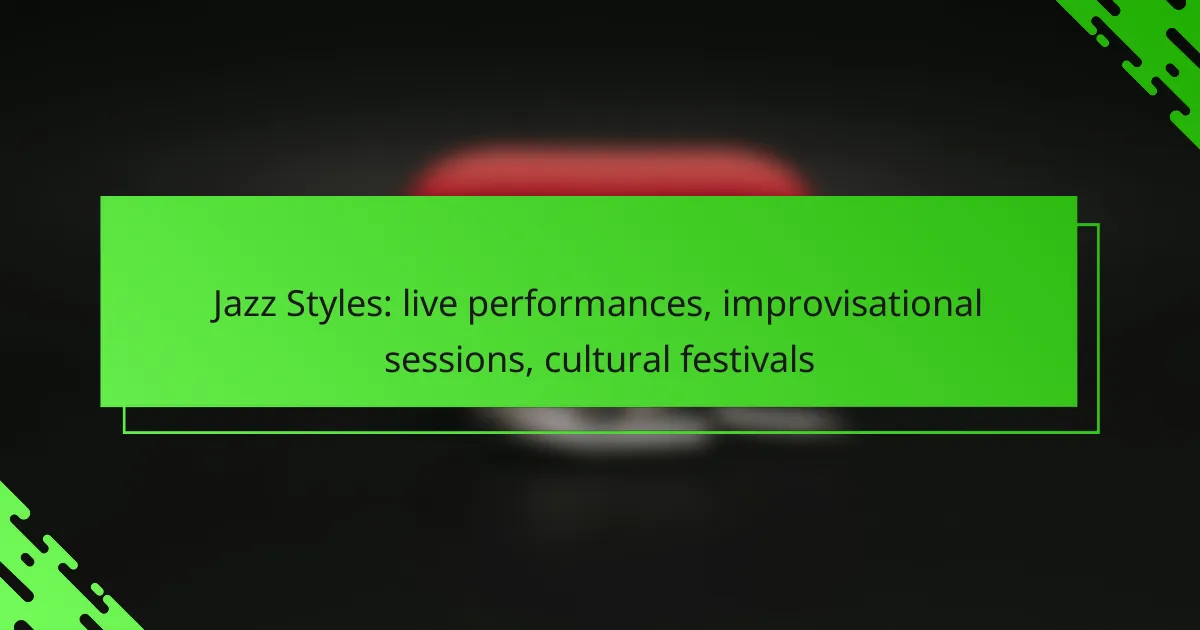Jazz is a dynamic genre that thrives in live performances, showcasing a variety of styles such as Traditional, Contemporary, and Fusion Jazz. Improvisational sessions are central to the jazz experience, allowing musicians to spontaneously create music in a collaborative environment. In the UK, cultural festivals serve as vibrant platforms for these performances, celebrating both established and emerging talent while fostering a rich exchange among jazz lovers.
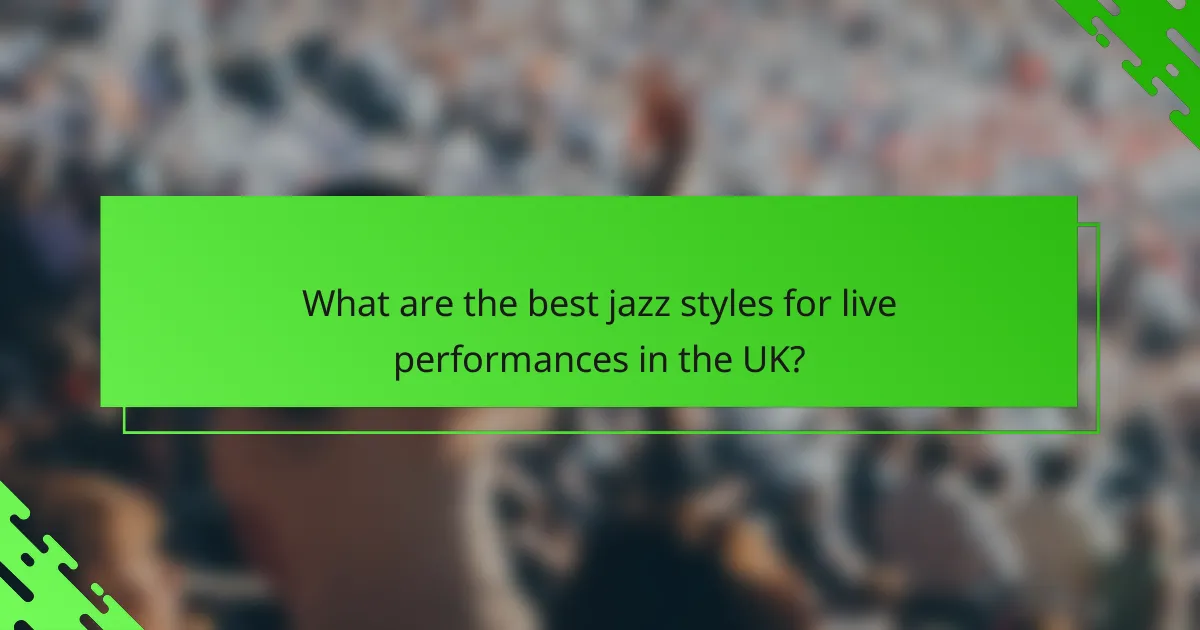
What are the best jazz styles for live performances in the UK?
The best jazz styles for live performances in the UK include Traditional Jazz, Contemporary Jazz, Fusion Jazz, Big Band Jazz, and Acid Jazz. Each style offers unique characteristics and appeals to different audiences, making them popular choices for venues and festivals.
Traditional Jazz
Traditional Jazz, often referred to as Dixieland, is characterized by its lively rhythms and collective improvisation. This style typically features instruments like the trumpet, clarinet, and trombone, creating a vibrant sound that is perfect for engaging live performances.
In the UK, Traditional Jazz is often showcased at festivals and clubs, where musicians emphasize the cultural roots of jazz. Venues that host Traditional Jazz performances frequently attract audiences looking for an authentic, nostalgic experience.
Contemporary Jazz
Contemporary Jazz blends elements from various genres, including rock, funk, and classical music, resulting in a diverse sound palette. This style often features innovative compositions and complex harmonies, appealing to modern audiences seeking fresh interpretations of jazz.
In live settings, Contemporary Jazz can vary widely in instrumentation and style, making each performance unique. Musicians often experiment with technology and new arrangements, which can lead to exciting and unexpected experiences for listeners.
Fusion Jazz
Fusion Jazz combines jazz with other musical styles, particularly rock and funk, creating a high-energy sound. This genre often incorporates electric instruments and synthesizers, making it popular in larger venues and festivals.
Performers in the UK are known for their improvisational skills in Fusion Jazz, often blending genres seamlessly. Audiences enjoy the dynamic performances that showcase both technical proficiency and creative expression.
Big Band Jazz
Big Band Jazz features large ensembles typically consisting of brass, woodwinds, and rhythm sections. This style is known for its rich harmonies and powerful sound, making it ideal for live performances in concert halls and festivals.
In the UK, Big Band performances often include classic arrangements from the swing era, attracting fans of all ages. The communal aspect of a big band creates a lively atmosphere, enhancing the overall concert experience.
Acid Jazz
Acid Jazz fuses jazz elements with hip-hop, funk, and soul, creating a modern and upbeat sound. This genre is particularly popular in club settings, where DJs and live musicians collaborate to create an engaging atmosphere.
In the UK, Acid Jazz has a strong following, with many clubs hosting live performances that encourage audience participation. The blend of improvisation and electronic beats makes Acid Jazz a vibrant choice for those seeking a contemporary jazz experience.
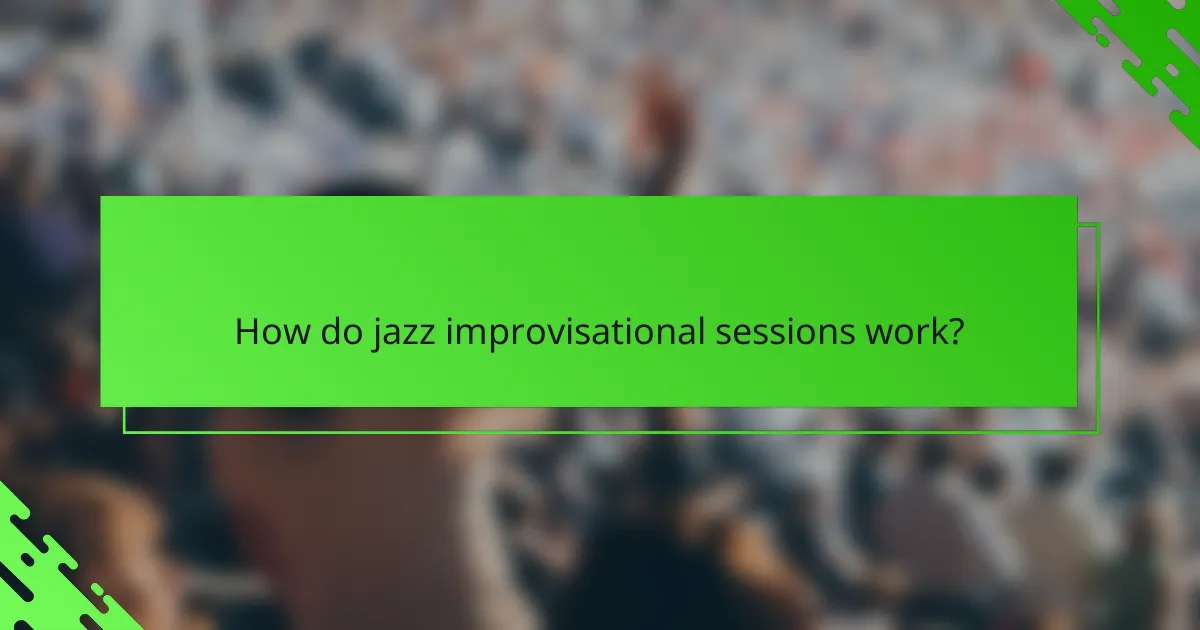
How do jazz improvisational sessions work?
Jazz improvisational sessions involve musicians spontaneously creating music, often based on a set chord structure or theme. These sessions emphasize creativity and collaboration, allowing performers to express themselves while responding to one another in real-time.
Call and Response Technique
The call and response technique is a fundamental aspect of jazz improvisation, where one musician plays a phrase (the call) and another responds with a complementary phrase. This interaction fosters a dynamic dialogue between performers, enhancing the overall musical experience.
In practice, this technique can be seen in various forms, such as a soloist playing a melody followed by the ensemble echoing or answering with a contrasting riff. It encourages active listening and engagement among musicians, making the performance more cohesive.
Chord Progressions
Chord progressions serve as the backbone of jazz improvisational sessions, providing a harmonic framework for musicians to explore. Common progressions, like the ii-V-I, create a familiar structure that allows for creative expression while maintaining musical coherence.
Musicians often experiment with variations of these progressions, adding extensions or substitutions to create unique sounds. Understanding these progressions is crucial for improvisers, as it helps them navigate changes smoothly and enhances their ability to interact with fellow performers.
Soloing Techniques
Soloing techniques in jazz improvisation involve various approaches that musicians use to create engaging solos. Techniques such as using scales, arpeggios, and motifs allow soloists to develop their musical ideas while maintaining a connection to the underlying chord progressions.
Effective soloing often incorporates elements like phrasing, dynamics, and rhythm to keep the audience captivated. Musicians should practice these techniques regularly, experimenting with different styles and approaches to find their unique voice within the improvisational context.
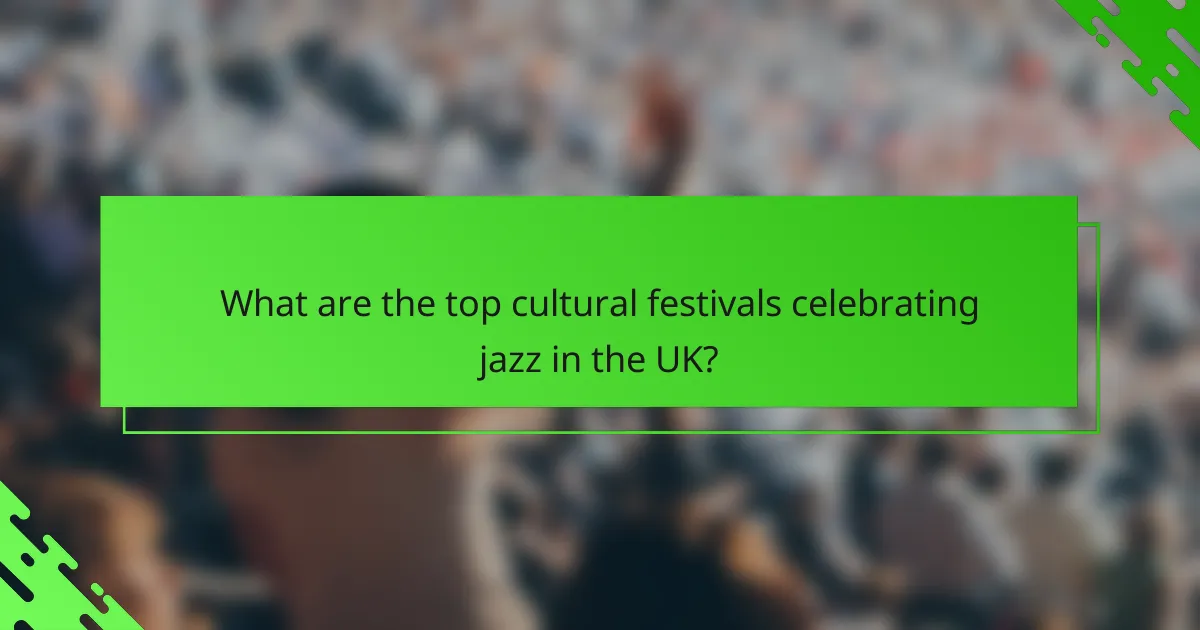
What are the top cultural festivals celebrating jazz in the UK?
The UK hosts several prominent cultural festivals that celebrate jazz, showcasing both established and emerging artists. These festivals provide a vibrant platform for live performances, improvisational sessions, and cultural exchange among jazz enthusiasts.
London Jazz Festival
The London Jazz Festival is one of the UK’s premier jazz events, typically held in November. It features a diverse lineup of international and local artists performing in various venues across the city, from concert halls to intimate clubs.
Attendees can expect a mix of genres within jazz, including traditional, contemporary, and experimental styles. The festival often includes workshops and talks, allowing fans to engage with musicians and learn more about the art form.
Manchester Jazz Festival
Manchester Jazz Festival, usually occurring in late July, focuses on showcasing new talent alongside established acts. This festival prides itself on its community feel, with performances taking place in unique locations throughout the city.
In addition to concerts, the festival often features street performances and free events, making it accessible to a wider audience. It’s a great opportunity for jazz lovers to discover emerging artists and enjoy a variety of performances.
Glasgow Jazz Festival
The Glasgow Jazz Festival, typically held in June, celebrates the rich jazz scene in Scotland. It includes a mix of concerts, workshops, and jam sessions, attracting both local and international musicians.
This festival emphasizes collaboration and improvisation, often featuring unique projects and cross-genre performances. Attendees can enjoy a vibrant atmosphere that highlights Glasgow’s cultural diversity and musical heritage.
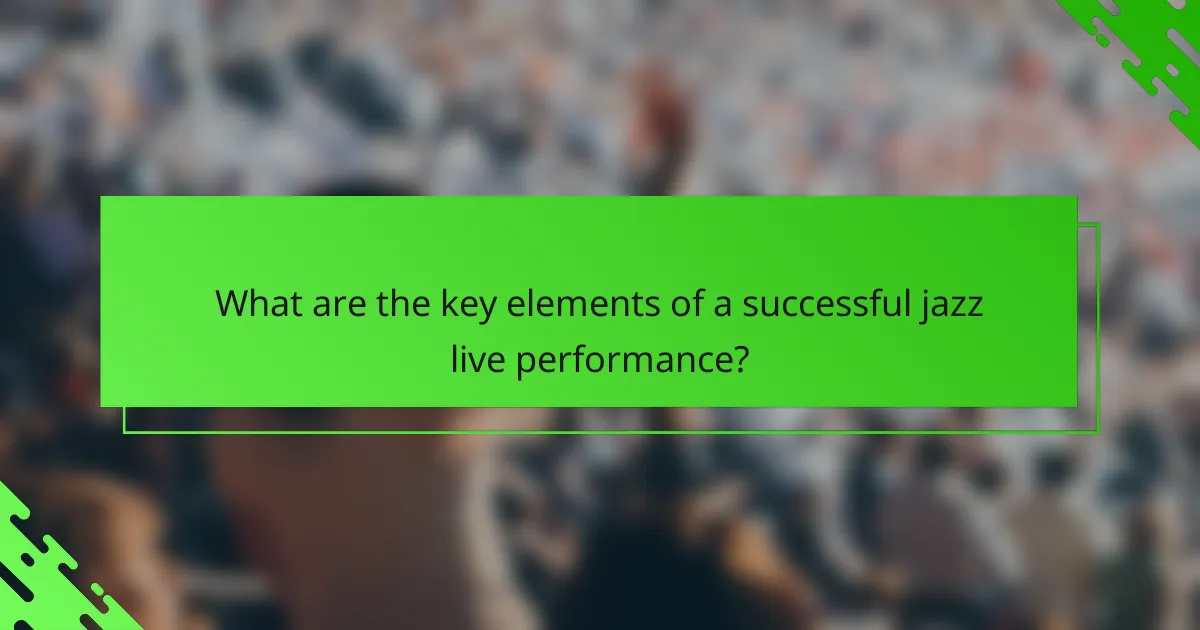
What are the key elements of a successful jazz live performance?
A successful jazz live performance hinges on effective musician collaboration, active audience engagement, and optimal venue acoustics. These elements work together to create an immersive experience that resonates with both performers and listeners.
Musician Collaboration
Collaboration among musicians is crucial in jazz, as it fosters spontaneity and creativity. Musicians often engage in improvisational sessions, where they build on each other’s ideas, creating a dynamic and fluid performance. Effective communication and a shared understanding of the music’s direction enhance this collaborative spirit.
To facilitate collaboration, musicians should establish a strong rapport and be open to experimentation. Regular rehearsals can help them develop a cohesive sound while allowing individual styles to shine through. This balance between unity and individuality is key to a memorable performance.
Audience Engagement
Engaging the audience is essential for a successful jazz performance. Musicians can create a connection by interacting with the crowd, encouraging participation, or sharing stories behind the music. This interaction not only enhances the experience but also makes the audience feel like a part of the performance.
Strategies for audience engagement include varying the setlist to include familiar tunes, inviting audience requests, or incorporating visual elements like lighting and stage presence. A responsive audience can elevate the energy of the performance, making it more enjoyable for everyone involved.
Venue Acoustics
The acoustics of a venue play a significant role in the overall quality of a jazz performance. Ideal venues have balanced sound distribution, allowing each instrument to be heard clearly without overpowering others. Factors such as room size, shape, and materials can greatly influence sound quality.
When selecting a venue, consider its acoustic characteristics and how they align with the performance style. Smaller, intimate spaces often enhance the connection between musicians and the audience, while larger venues may require additional sound equipment to ensure clarity. Testing the sound setup before the performance can help identify any adjustments needed for optimal acoustics.
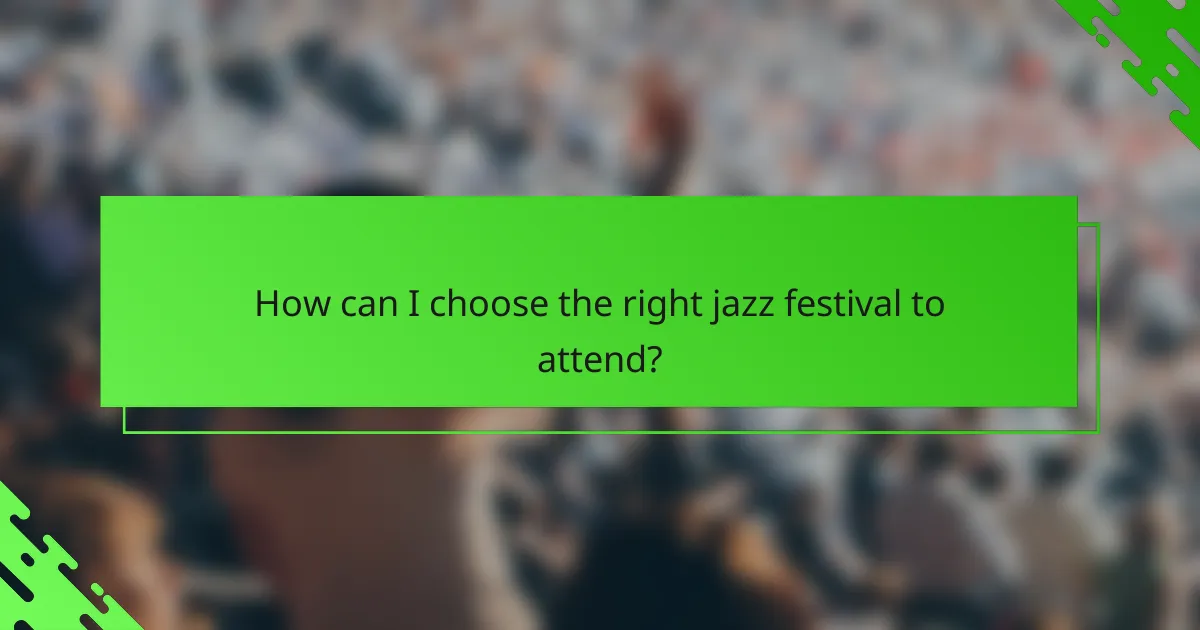
How can I choose the right jazz festival to attend?
Choosing the right jazz festival involves considering factors like location, lineup, and atmosphere. Researching the festival’s history and audience can also help ensure a fulfilling experience.
Consider the Location
The location of a jazz festival can greatly influence your experience. Festivals held in vibrant cities often offer additional attractions, such as local cuisine and cultural landmarks. If you prefer a more intimate setting, look for smaller festivals in scenic areas.
Review the Lineup
Check the lineup of artists scheduled to perform at the festival. Look for well-known headliners as well as emerging talent to get a mix of experiences. Many festivals provide a range of styles, from traditional jazz to contemporary interpretations, so choose one that aligns with your musical preferences.
Evaluate the Atmosphere
The atmosphere of a jazz festival can vary widely. Some festivals are more relaxed and family-friendly, while others may cater to a party vibe. Reading reviews and watching videos from past events can help you gauge the overall ambiance and decide if it suits your taste.
Check for Additional Activities
Many jazz festivals offer workshops, jam sessions, and panel discussions in addition to performances. These activities can enhance your experience and provide opportunities to learn from musicians. Look for festivals that include these extras if you want a more immersive experience.
Plan Your Budget
Consider your budget when choosing a jazz festival. Ticket prices can vary significantly, ranging from free events to premium-priced festivals. Additionally, factor in travel, accommodation, and food costs to ensure you stay within your financial limits.
